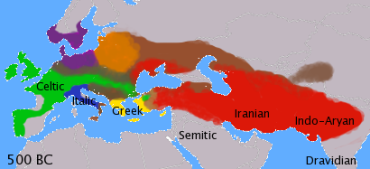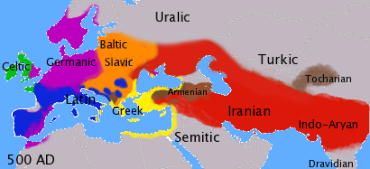Let's start 5,500 years ago, a group of speakers that lived in Europe (exact location a debated topic, let's say it was the south of Russia, to follow the most mainstream opinion), they are called the Indo-Europeans.
People migrated / moved around / split up....
Current classifications divide the languages of the split by the word they used to describe "one hundred", the centum and satem languages. The satem languages were the ones to the East, that developed into the modern languages such as Polish / Latvian / Urdu / Punjabi / Kurdish / Bosnian, there were many branches of this side of the Indo-European language family. You can see an exact language family tree for the Satem languages here.
The other side of the split were the centum (pronounced 'kentum') languages, which consisted of some further groups of people that again migrated and their language evolved further into more subfamilies such as the Hellenic branch (which is the ancestor of Modern Greek), the Celtic branch, (which is the ancestor of Welsh/Scottish/Irish), the Anatolian / Toccharian branches...
... and finally the ones we are interested in, the Italic branch and the Germanic branch.
So somewhere between 1,000BC and 500BC, there were two groups of speakers, one Italic and one Germanic. The story of Germanic is that people migrated west and one group stayed behind, this is called the East Germanic branch and developed into Gothic (which is now extinct). Now what happened is some speakers went north and we had the North Germanic branch (also called 'Scandinavian', which developed into Old Norse, which then further split into East/West, and modern Norwegian/Faroese and Icelandic belong to West Norse while Swedish and Danish belong to East Norse.
So while all this is going on our speakers didn't stay still... no no they kept moving West into (I'm sure you can guess it  !!) the West Germanic branch, which then further split into the German dialects, Dutch, Frisian, Saxon, and (the ancestor of) English.
!!) the West Germanic branch, which then further split into the German dialects, Dutch, Frisian, Saxon, and (the ancestor of) English.
So the speakers of these languages were all happy playing along around the borders of Germany/Denmark and they hear about the Romans leaving England, so they invade afterwards and bring the language which is to become English, to England (obviously it wasn't called England before they arrived.
So then the language further develops, well the dialects of the Angles, Saxons and the Jutes all spread around, resulting in today a huge massive collection of various dialects united by a standardised common language. This is where England's rich set of accents / dialects is from, these closely related (but not 100% linguistically united) peoples.
So you can see why English is a Germanic language, becomes earlier it was the same language spoken by the same ancestors of the current speakers of Dutch/Frisian/German etc, whose earlier ancestors were the same as the speakers of all Scandinavian languages and even earlier the ancestors of the Gothic people, all the same group of people, just constant evolution / mutation of the language to lead to this way I am typing to you now.
Right, where are we now? Okay, so Italic establishes itself and has a few related dialects with Latin being one of them (the only other major branch I can remember is Umbrian at the moment) but Latin established itself about the same time the Germanic speakers were all one united group.
The story then is complicated, but I'm trying to give the basic story with a lot of generalised details, but what happens is the Latin of the people (Vulgar Latin) develops, and the Romans spread all over Europe, setting up base in Portugal / Spain / Franch / Italy (where they already were), Africa, you name it, the Romans had people there, all speaking this "Latin of the people", which by this time is usually referred to as "Proto-Romance, and it is just the daughters of Latin.
Latin spread across Europe, and just like what happened with the Germanic languages, closed contact especially after the fall of the Roman Empire in about 500AD meant the language of these people can slowly start evolving / developing into further dialects.
And what do you know, these descendants of the Romans start talking differently and before you know it, you have Portuguese, French, Italian, Spanish, Romanian.... the developments of the once united language spoken in Rome (Latin) which was a development out of the Italic branch, which at one time was the same language that the ancestors of Germanic spoke.
So that's why French belongs to the Romance (Italic) language family, and English belongs to the Germanic language family. Just like I posted before here is a link to the family tree for the centum languages.
I found some pictures on a Wikipedia site that might prove more illustrative, as I said before around 1,000BC the picture looked like:

It doesn't state it there but the purple is Germanic, as you see two separate branches / separations of a once-earlier united language.
Then the following picture represents the period immediately after the fall of the Roman Empire (note that the purple Germanics have just landed in the UK).

And that, with the pictures I hope clears up my (quite rushed/low quality) explanation of the origins of both languages.
Now after all this happened, after 1066 the French speaking Normans invaded and English borrowed a lot of words from French, and while Latin was still used as a lingua-franca around Europe all the new terminology (for example, scientific discoveries etc) was taken from Latin.
This is why English is full of cognates with French/Latin, but these are only vocabulary changes, the core grammar, the history, the syntax, it's all (as John said earlier) very closely related to the other Germanic languages.
To someone who looks at pages and pages of the language, the only thing they see are the words, which might lead them to think of a relation, but linguists can see beyond the words, they can see the ordering, they can see the syntax, then see the grammatical functions and only once you view languages in a way that isn't only at the words that are in the lexicon, can you then see how there is nothing really "Romance" about English.
Also please refer to Language map

